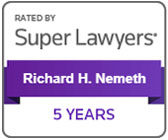Repossession Defense
If you fall behind in loan payments for a vehicle, the normal remedy is for the vehicle lender to hire a repossession company to take possession of your vehicle. A court order is normally not required for the repossession gent to pick up your vehicle. Rather, a repossession agent normally picks up the car without your consent. Sometimes a repossession agent will knock on your door in the company of a police officer and advise you that he is here to pick up your vehicle. Other times you may just wake up one morning and the car will be gone.
When you file bankruptcy, repossession is prohibited. If the car is in your possession at the time you file bankruptcy, the lender is prohibited from having a repossession agent pick up the car, even if you are behind in your payments. If the repossession agent has recently picked up the car, but has not yet sold it, the car must be returned to you if you file bankruptcy and ask for it to be returned. In order to keep the car, you will have to make arrangements to repay the debt on the vehicle. If you are only a month or two behind and have the money with which to pay the arrearage, you can simply tender this money to the lender. In a Chapter 13 proceeding it is
possible to pay far less for the vehicle than you may be obligated to pay on you loan outside of bankruptcy. For example, the Chapter 13 plan may, in the right circumstances, reduce the principal balance, reduce the interest rate, and/or lengthen the repayment term of the loan. By using these rights, you can often substantially reduce not only the amount that you pay per month, but also the total amount that you pay in order to keep the vehicle. In a Chapter 7 proceeding, it may be possible to “redeem” the vehicle. In bankruptcy law, you are able to keep a vehicle if you pay the lender the value of the vehicle, rather than what you owe on it. In many cases, the amount you owe exceeds the value of the vehicle. There are lending resources available to those who want to buy their car out of bankruptcy and the “redemption” value. This can often save thousands of dollars over the life of the loan. Talk to your attorney about these options.






















